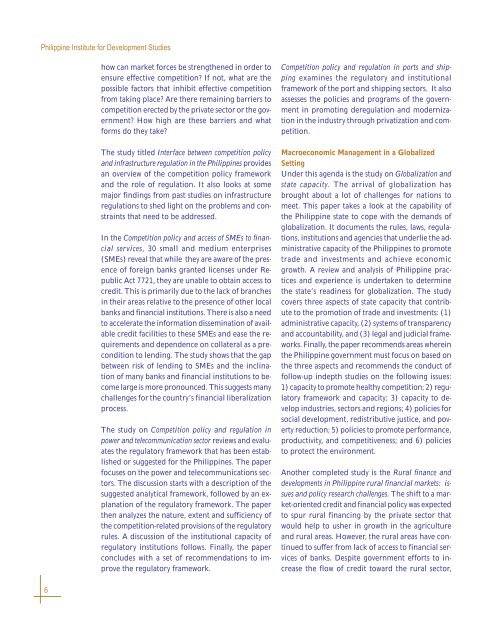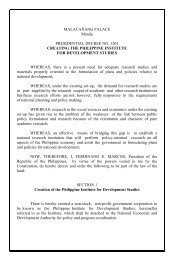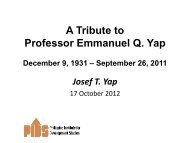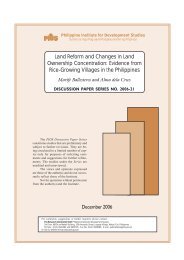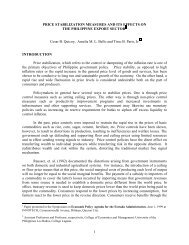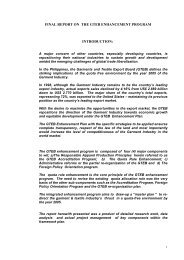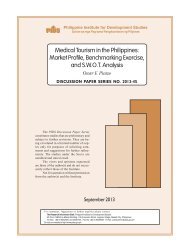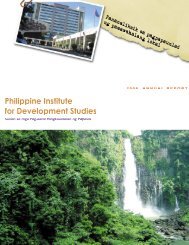Policy Research Helping Provide Affordable Rice to Filipinos
download pids 2004 annual report - Philippine Institute for ...
download pids 2004 annual report - Philippine Institute for ...
Create successful ePaper yourself
Turn your PDF publications into a flip-book with our unique Google optimized e-Paper software.
Philippine Institute for Development Studieshow can market forces be strengthened in order <strong>to</strong>ensure effective competition? If not, what are thepossible fac<strong>to</strong>rs that inhibit effective competitionfrom taking place? Are there remaining barriers <strong>to</strong>competition erected by the private sec<strong>to</strong>r or the government?How high are these barriers and whatforms do they take?The study titled Interface between competition policyand infrastructure regulation in the Philippines providesan overview of the competition policy frameworkand the role of regulation. It also looks at somemajor findings from past studies on infrastructureregulations <strong>to</strong> shed light on the problems and constraintsthat need <strong>to</strong> be addressed.In the Competition policy and access of SMEs <strong>to</strong> financialservices, 30 small and medium enterprises(SMEs) reveal that while they are aware of the presenceof foreign banks granted licenses under RepublicAct 7721, they are unable <strong>to</strong> obtain access <strong>to</strong>credit. This is primarily due <strong>to</strong> the lack of branchesin their areas relative <strong>to</strong> the presence of other localbanks and financial institutions. There is also a need<strong>to</strong> accelerate the information dissemination of availablecredit facilities <strong>to</strong> these SMEs and ease the requirementsand dependence on collateral as a precondition<strong>to</strong> lending. The study shows that the gapbetween risk of lending <strong>to</strong> SMEs and the inclinationof many banks and financial institutions <strong>to</strong> becomelarge is more pronounced. This suggests manychallenges for the country’s financial liberalizationprocess.The study on Competition policy and regulation inpower and telecommunication sec<strong>to</strong>r reviews and evaluatesthe regula<strong>to</strong>ry framework that has been establishedor suggested for the Philippines. The paperfocuses on the power and telecommunications sec<strong>to</strong>rs.The discussion starts with a description of thesuggested analytical framework, followed by an explanationof the regula<strong>to</strong>ry framework. The paperthen analyzes the nature, extent and sufficiency ofthe competition-related provisions of the regula<strong>to</strong>ryrules. A discussion of the institutional capacity ofregula<strong>to</strong>ry institutions follows. Finally, the paperconcludes with a set of recommendations <strong>to</strong> improvethe regula<strong>to</strong>ry framework.Competition policy and regulation in ports and shippingexamines the regula<strong>to</strong>ry and institutionalframework of the port and shipping sec<strong>to</strong>rs. It alsoassesses the policies and programs of the governmentin promoting deregulation and modernizationin the industry through privatization and competition.Macroeconomic Management in a GlobalizedSettingUnder this agenda is the study on Globalization andstate capacity. The arrival of globalization hasbrought about a lot of challenges for nations <strong>to</strong>meet. This paper takes a look at the capability ofthe Philippine state <strong>to</strong> cope with the demands ofglobalization. It documents the rules, laws, regulations,institutions and agencies that underlie the administrativecapacity of the Philippines <strong>to</strong> promotetrade and investments and achieve economicgrowth. A review and analysis of Philippine practicesand experience is undertaken <strong>to</strong> determinethe state’s readiness for globalization. The studycovers three aspects of state capacity that contribute<strong>to</strong> the promotion of trade and investments: (1)administrative capacity, (2) systems of transparencyand accountability, and (3) legal and judicial frameworks.Finally, the paper recommends areas whereinthe Philippine government must focus on based onthe three aspects and recommends the conduct offollow-up indepth studies on the following issues:1) capacity <strong>to</strong> promote healthy competition; 2) regula<strong>to</strong>ryframework and capacity; 3) capacity <strong>to</strong> developindustries, sec<strong>to</strong>rs and regions; 4) policies forsocial development, redistributive justice, and povertyreduction; 5) policies <strong>to</strong> promote performance,productivity, and competitiveness; and 6) policies<strong>to</strong> protect the environment.Another completed study is the Rural finance anddevelopments in Philippine rural financial markets: issuesand policy research challenges. The shift <strong>to</strong> a market-orientedcredit and financial policy was expected<strong>to</strong> spur rural financing by the private sec<strong>to</strong>r thatwould help <strong>to</strong> usher in growth in the agricultureand rural areas. However, the rural areas have continued<strong>to</strong> suffer from lack of access <strong>to</strong> financial servicesof banks. Despite government efforts <strong>to</strong> increasethe flow of credit <strong>to</strong>ward the rural sec<strong>to</strong>r,6


